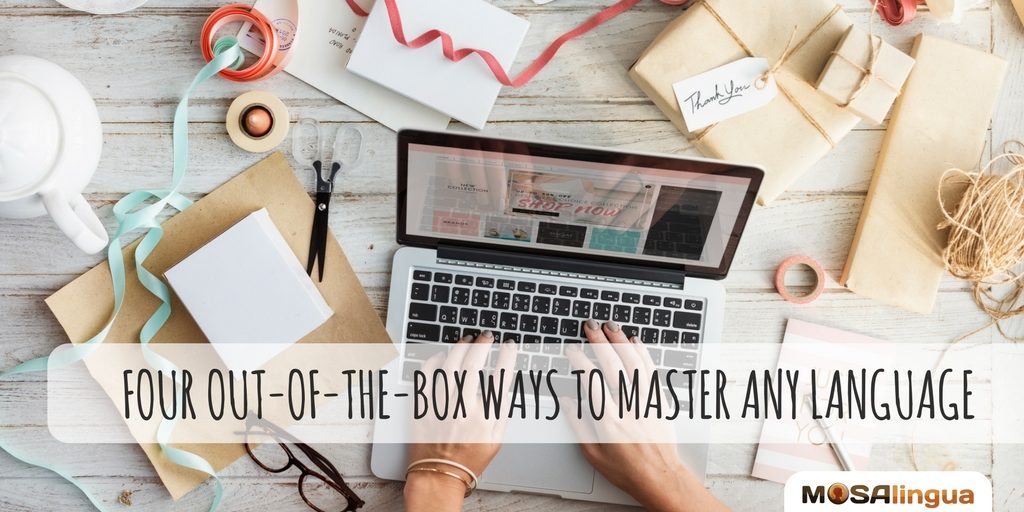I was born in Western India and grew up speaking Gujarati and Hindi. My family emigrated to the United States when I was 8 years old. I had a tough time learning the English language, and a tougher time speaking it fluently. Over 20+ years of practice, I eventually mastered it and now it’s the primary language that I speak and think in. Here’s what I learned along the way about the process of learning and speaking a new language. These tips to master any language apply to learning any new language, whether you’re a beginner or an advanced speaker.

Four Out-of-the-Box Ways to Master Any Language
1. Use Mnemonic Devices, such as a Memory Journey, to Build Your Vocabulary
The Method of Loci, also known as a memory journey, is one of the oldest memorization techniques used in ancient times, and research shows it’s still one of the most potent techniques today. To create memory journeys, you start with an extremely familiar location you can visualize at a moment’s notice, such as your house. You then compartmentalize the house into stations, such as the different rooms in the house. In each of these stations, you store vivid mnemonic images of words (otherwise boring bits of information) that you’re trying to remember. The journey then, is determined by the same exact order in which you go from station to station.
Throwing in sounds and smells to make the images even more concrete in your mind makes each word even harder to forget over time. Because of their vividly visual nature, memory journeys would work exceptionally well for learning signs in American Sign Language. Here’s a great primer on constructing a memory journey for learning any language.
Memory journeys boost recall and long-term memory using untapped reserves in our brain. Since most of us rarely ever use this method to remember, we miss out on the opportunity to fully use all of our brain power. And once we learn how to use memory journeys, they not only get easier and more powerful, but we can apply them to all kinds of tasks such as grocery lists, studying for exams, business presentations, storytelling, and more.
2. Aim for Flow Experiences During Learning
“If you are interested in something, you will focus on it, and if you focus attention on anything, it is likely that you will become interested in it. Many of the things we find interesting are not so by nature, but because we took the trouble of paying attention to them.”
― Mihaly Csikszentmihalyi, Finding Flow: The Psychology of Engagement with Everyday Life
Whether you’re learning a new sport, a new instrument, or a new language, you have an opportunity to achieve flow: a state of mind where 100% of your attention is focused on mastering, creating, or learning something in order to overcome a challenge defined with clear goals. “Flow” experiences are extraordinary, effortless, and intense in contrast to everyday experiences of daily life.
In other words, when learning a new language, increase the chance of achieving flow in every session by setting a tough, but manageable goal. Why? Flow activities generate bouts of happiness which we can repeat over and over by our own doing, that is, we’re not bound to favorable, or expensive, external circumstances. The more sessions you can successfully achieve flow in, the happier you become as a person, the more you’ll keep pushing yourself forward, and the less ulterior motivation you’ll need to achieve your goal of learning and speaking a new language.
For more on flow experiences and activities, read the full book by Mihaly Csikszentmihalyi, Flow: The Psychology of Optimal Experience
3. Override Your Inner Voices
When I was learning English, I wish I knew then what I know now from W. Timothy Gallwey’s book “The Inner Game of Tennis.” Gallwey shares that in trying to become good at anything, every single person battles inner voices in their head that create mental roadblocks to optimal performance. These roadblocks disrupt your ability to concentrate. They also make you nervous, self-conscious, and more prone to mistakes.
As I began to speak English more regularly with every new friend or classmate, I became more conscious about my accent, my pronunciation, my inability to get jokes or hip hop references. It was a paradox: the more I knew English, the more nervously I spoke it. You get around and past the hurdles over the years, but now I can’t help but wonder, “how quickly would I have mastered fluency if I got out of my own head?”
One answer to overcoming these self-doubts is to engage in relaxed concentration. When training a new skill or language, you need to focus fully on the subject at hand and eliminate external thoughts that could spoil your progress. Breathing exercises help remedy the problem. Here are 3 out-of-the-box breathing exercises you can try before your next language learning session. You might even benefit from learning about breathing exercises used by singers to open up your vocal cords, while helping you relax.
Quieting these inner voices permanently is impossible, therefore, a more practical solution is to redirect your energy to the positive aspects of your training through relaxed concentration.
4. Reinforce Growth Mindset Principles
“If plan A doesn’t work, the alphabet has 25 more letters – 204 if you’re in Japan.” – Claire Cook
Learning English in America is mandatory to thrive. But if you’re trying to learn a new language for travel or recreational reasons, you most likely view the new skill as optional. Whether or not you master it won’t “make or break” you.
These are the voices of a fixed mindset. It’s a passive mode of thinking that’ll open your mind just enough to learn a language that’s necessary for survival. Anything beyond that is simply out of your range.
A growth mindset is the opposite: it opens your mind and turns it into a magnet. It enables you to want to learn and grow beyond what’s ordinarily expected of you. Many of us learn new languages to stretch our brain’s limits, to better appreciate other cultures, or to become well-rounded individuals.
To see your language learning goals all the way through, a growth mindset keeps you on track and propels you forward during challenging times when you feel like quitting. Keep repeating to yourself that hard work and small wins will lead you to the finish line, just like training for a marathon.
If you’re unfamiliar with the two mindsets that dictate how we approach everything from school to business to personal relationships, check out Carol Dweck’s groundbreaking research in her book Mindset.
Conclusion on Four Out-of-the-Box Ways to Master Any Language
Learning a new language and persevering until you can speak it fluently is a difficult but extremely rewarding challenge to undertake. Follow these helpful tips to master any language to keep the big picture in perspective and the end goal in mind.
This guest post was written by a member of the TakeLessons community, connecting students with experienced teachers since 2006. They offer music and language lessons, sports, and academic tutoring. Feel free to check out their private lessons or online classes.
Related posts:
Want to start improving your language skills today?
Start learning a new language today

Good news: we can help!
More good news: you can get started for free! Start your free trial now and for the next 15 days, take advantage of the most effective language learning method on the market!
Vocabulary flashcards, videos with subtitles, audiobooks, articles adapted to your level – with MosaLingua Premium (Web & Mobile), you’ll have access to all this and more. Get started right now. It’s free—and risk-free—to try!








Comments